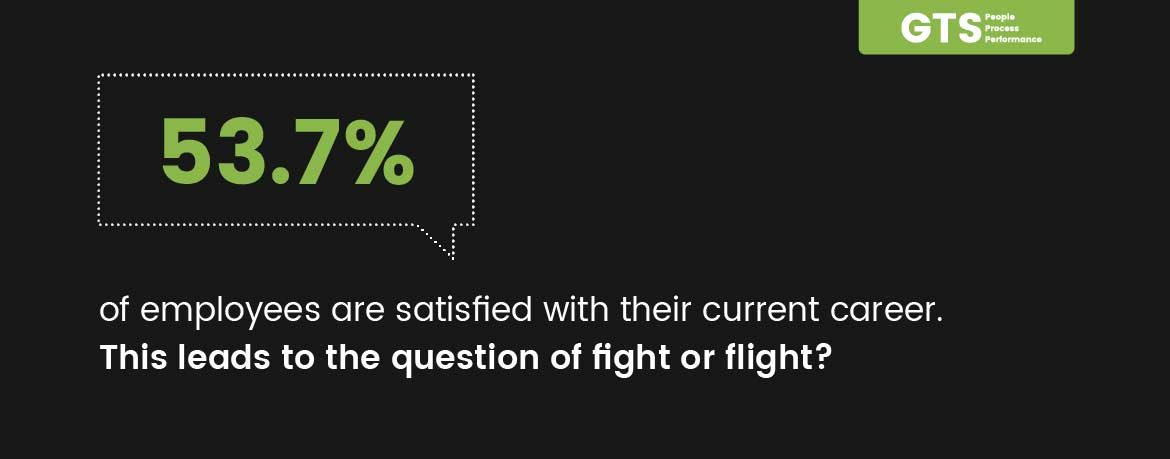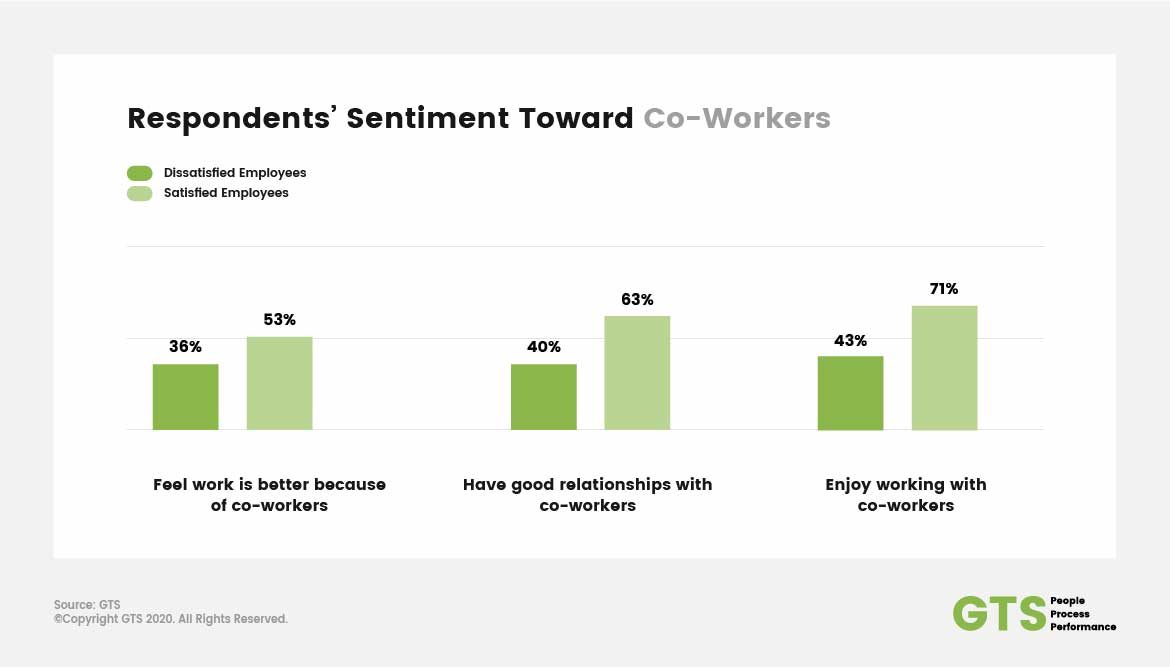Four Causes of Loss in Job Satisfaction and the Impact On Your Employees’ Personal Well-being
As we look forward to the start of a new year in 2021, we can’t help but wonder how many of our placements from previous years or current hiring managers are thinking about changing companies. Upon further research, only 53.7% of employees are satisfied with their current career. This leads to the question of fight or flight? Will they stay with their current company and choose to fight for their professional development with their current employer to improve their situation? Or will they choose flight and find a new role with a new company for a fresh start? To analyze this further, it is critical to address what the key factors are that make 46.3% of the workforce so unhappy. The big picture is that one’s work situation can impact their happiness, health and wellness while outside of work. It is important to decide whether or not the work dissatisfaction impacts life outside of work when choosing fight or flight.

It is common to link the stress/anxiety/pressure that comes along with one’s career with personal health. Upon research, it was interesting to find that while 46.3% of Americans are dissatisfied with their career, only 13% of the population is dissatisfied with their health (despite data that argues there should be a greater concern/focus on personal health and wellness).
With greater than 3 times the amount of dissatisfied workers than those dissatisfied with their fitness there needs to be more attention paid to professional development solutions! It’s common to see advertisements and media about getting a new job. For example, Indeed/ZipRecruiter advertisements encourage workers that the “flight” option to the next job/company will fix all of their problems. There is a massive consumer market for health and wellness (Peloton, Bowflex, Weight Watchers) but where are the employee programs coaching individuals on how to participate in developing their careers with their current employers? Developing your employees and coaching them on how to further their career can help them be happier in their job, but first employers must know what components go into job satisfaction.
Below are the most pertinent factors in Job Satisfaction.
1. Personal Health and Wellness (sleep!)
Sleep is directly impacted by a dissatisfying career, and a poor night’s sleep typically means poor productivity throughout the day. Only 7 percent of dissatisfied workers reported feeling rested in the morning and energetic all day. Employers consistently focus on their benefits package (401K, healthcare plan, PTO). However, If your employees are dissatisfied and having a harder time getting out of bed in the morning they are less likely to leverage the benefits of these packages. Dissatisfied employees also attributed shortcomings at work impacting their finances. (Who can think about their 401K when their day to day finances are out of order?)
Programs that should be considered by employers could be for employees managing their finances and also evaluating employees on their sleep. These types of programs should be optional, of course, but if a problem sleeping at night can be traced back to a poor relationship with a manager or coworker, this could have a drastic impact on the employee’s day to day satisfaction at work (and the extra sleep each night will make them a more productive employee).
2. Human Connection

Promoting healthy relationships at work should directly correlate to the lives of employees when they are outside of work. This is the same to say for employees who actively work to improve their relationships with friends or family or their spouse outside of the office. This is where “work life balance” beget one another. Toxic relationships at work encourage toxic relationships/behaviors outside of work (and vice versa).
Make sure to consider virtual employees and how to keep them connected to co-workers. A solution to this could be virtual meetups in place of in person interactions. The fitness industry has already started to evolve in this area with things like virtual spinning classes, led by instructors. Don’t hesitate to be the “instructor” for a virtual team meet up. These virtual gatherings keep the team close to one another even if they aren’t in the same state or time zone! Not being able to make it to brick and mortar is no longer an excuse for missing a workout. Furthermore, not building relationships with your co-workers if you are pivoting to a virtual workplace is not an excuse to miss a team building event.
3. Satisfying Work (Variety & Initiative)
We all aren’t working on the cure for cancer! But some of us are, or we are indirectly making an impact on something innovative so you may not need to do much to provide satisfying work to your team on a daily basis. For those whose day to day might not be clear on how it is making an impact to the outside world the narrative can go in a negative direction. “Of course I hate my job — that’s why they pay me to do it.” Many people still have the attitude that if you’re enjoying work, you’re not working hard enough, and that the only path to career success is to work long hours and sacrifice everything else in your life for a job that makes you miserable.
From the employee perspective, don’t lose sight of the fact that employment is good. In 2020 alone, and it seems like once a decade, unemployment rates rose to greater than 10%. Remember, you may feel unsatisfied with your job at the moment but you’d be far unhappier without one. If your employer isn’t challenging you with new assignments providing an opportunity to expand your skill set, take the initiative and seek them out. Force yourself to develop daily in your professional life, others can try to motivate you but they aren’t going to take the initiative for you.
4. Rewards and Incentives
Be ready to lose top talent if you aren’t already incentivizing and rewarding your top producers, as you competitors are. Incentive trips, profits sharing, company equity, bonuses/commissions should all be included under this category. Professional development needs to fall under this bucket as well. Hit your goals and we will reward you with more responsibility and will provide you with adequate time and training to develop you as a leader.
Don’t lose sight of the fact that rewards/incentives aren’t everything. People have their lives and family to go home to on a daily basis and over the weekends and you don’t want to encourage them to let those relationships/experiences pass them by (maybe a little more for those early in their careers still trying to develop their skills and find the niche, but age and experience are relative to where each employee is at in their life). Think, from your employees perspective, what this Hastings quote will mean to them; “When I put the last kid through college, that will be it! When I have paid off the mortgage, that will be it! When I win a promotion, that will be it! When I reach the age of retirement, that will be it! I shall live happily ever after!” Unfortunately, once we get it, then it disappears. The station somehow hides itself at the end of an endless track.”
What we can learn from this quote is to be sure that the culture of the company isn’t about the reward, but the journey and the development along the way which resulted in the reward being earned.
Bonus: Company Culture
I don’t know too many folks who choose their career seeking out new friends, but is yours the type of organization where people make lifelong friendships? Have snacks in the breakroom, as good food is always well received but be sure to do more than that. For example, virtual events have become common, do a company happy hour but also try and include events for those that don’t want to have a drink in their home office at 4pm on a Wednesday. A holiday yoga session, or virtual cycling class could be a few good ideas.
Most importantly, make it a point to check in regularly and often. You can’t predict or assume you know how your team feels so ask questions, how are they doing, how is the company doing to cater a challenging, rewarding and safe environment. And don’t just hear the feedback, listen and execute on reasonable upgrades you can make from these conversations. Coaching is a two way street, you can coach your team, and they can coach you on how to make their lives more enjoyable/healthy.
Improve Morale with New Hires
One of the best ways to improve company morale is with a fresh influx of new talent (but more importantly the right talent that aligns with the upward direction of your company). Work with us today and find the best fit for your organization.
